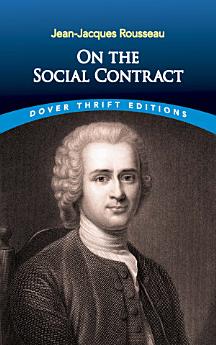On the Social Contract
مارچ 2012 · Courier Corporation
3.2star
8 جائزےreport
ای بک
112
صفحات
reportدرجہ بندیوں اور جائزوں کی تصدیق نہیں کی جاتی ہے مزید جانیں
اس ای بک کے بارے میں
"Man was born free, but everywhere he is in chains. This man believes that he is the master of others, and still he is more of a slave than they are. How did that transformation take place? I don't know. How may the restraints on man become legitimate? I do believe I can answer that question …"
Thus begins Rousseau's influential 1762 work, Du Contract Social. Arguing that all government is fundamentally flawed, and that modern society is based on a system that fosters inequality and servitude, Rousseau demands nothing less than a complete revision of the social contract to ensure equality and freedom.
Noting that government derives its authority by the people's willing consent (rather than the authorization of God), Rousseau posits that a good government can justify its need for individual compromises, rewarding its citizens with "civil liberty and the proprietorship of all he possesses." The controversial philosopher further suggests that promoting social settings in which people transcend their immediate appetites and desires leads to the development of self-governing, self-disciplined beings.
A milestone of political science, these essays introduced the inflammatory ideas that led to the chaos of the French Revolution, and are considered essential reading for students of history, philosophy, and other social sciences.
Thus begins Rousseau's influential 1762 work, Du Contract Social. Arguing that all government is fundamentally flawed, and that modern society is based on a system that fosters inequality and servitude, Rousseau demands nothing less than a complete revision of the social contract to ensure equality and freedom.
Noting that government derives its authority by the people's willing consent (rather than the authorization of God), Rousseau posits that a good government can justify its need for individual compromises, rewarding its citizens with "civil liberty and the proprietorship of all he possesses." The controversial philosopher further suggests that promoting social settings in which people transcend their immediate appetites and desires leads to the development of self-governing, self-disciplined beings.
A milestone of political science, these essays introduced the inflammatory ideas that led to the chaos of the French Revolution, and are considered essential reading for students of history, philosophy, and other social sciences.
درجہ بندی اور جائزے
3.2
8 جائزے
مصنف کے بارے میں
Jean Jacques Rousseau was a Swiss philosopher and political theorist who lived much of his life in France. Many reference books describe him as French, but he generally added "Citizen of Geneva" whenever he signed his name. He presented his theory of education in Emile (1762), a novel, the first book to link the educational process to a scientific understanding of children; Rousseau is thus regarded as the precursor, if not the founder, of child psychology. "The greatest good is not authority, but liberty," he wrote, and in The Social Contract (1762) Rousseau moved from a study of the individual to an analysis of the relationship of the individual to the state: "The art of politics consists of making each citizen extremely dependent upon the polis in order to free him from dependence upon other citizens." This doctrine of sovereignty, the absolute supremacy of the state over its members, has led many to accuse Rousseau of opening the doors to despotism, collectivism, and totalitarianism. Others say that this is the opposite of Rousseau's intent, that the surrender of rights is only apparent, and that in the end individuals retain the rights that they appear to have given up. In effect, these Rousseau supporters say, the social contract is designed to secure or to restore to individuals in the state of civilization the equivalent of the rights they enjoyed in the state of nature. Rousseau was a passionate man who lived in passionate times, and he still stirs passion in those who write about him today.
اس ای بک کی درجہ بندی کریں
ہمیں اپنی رائے سے نوازیں۔
پڑھنے کی معلومات
اسمارٹ فونز اور ٹیب لیٹس
Android اور iPad/iPhone.کیلئے Google Play کتابیں ایپ انسٹال کریں۔ یہ خودکار طور پر آپ کے اکاؤنٹ سے سینک ہو جاتی ہے اور آپ جہاں کہیں بھی ہوں آپ کو آن لائن یا آف لائن پڑھنے دیتی ہے۔
لیپ ٹاپس اور کمپیوٹرز
آپ اپنے کمپیوٹر کے ویب براؤزر کا استعمال کر کے Google Play پر خریدی گئی آڈیو بکس سن سکتے ہیں۔
ای ریڈرز اور دیگر آلات
Kobo ای ریڈرز جیسے ای-انک آلات پر پڑھنے کے لیے، آپ کو ایک فائل ڈاؤن لوڈ کرنے اور اسے اپنے آلے پر منتقل کرنے کی ضرورت ہوگی۔ فائلز تعاون یافتہ ای ریڈرز کو منتقل کرنے کے لیے تفصیلی ہیلپ سینٹر کی ہدایات کی پیروی کریں۔







